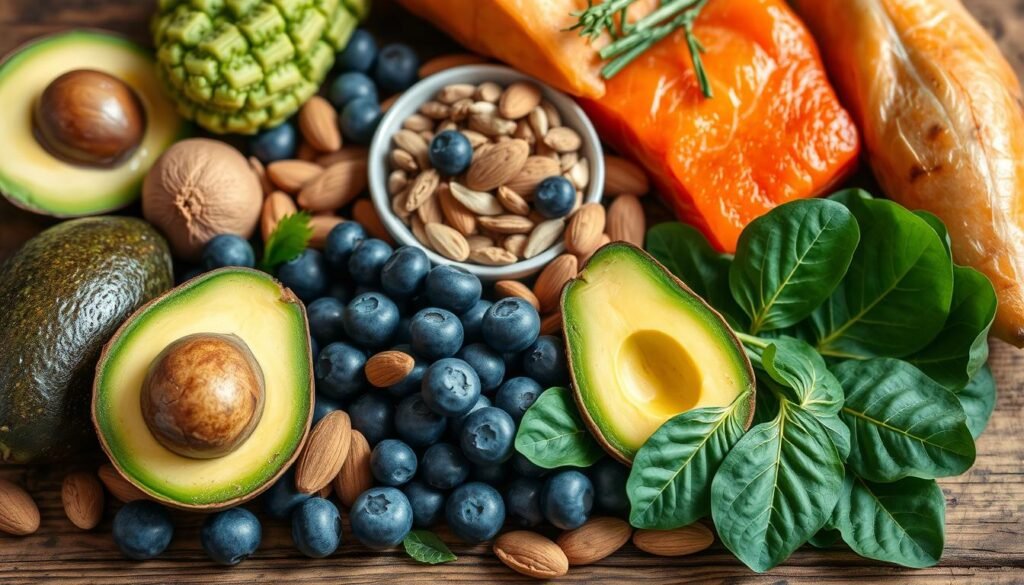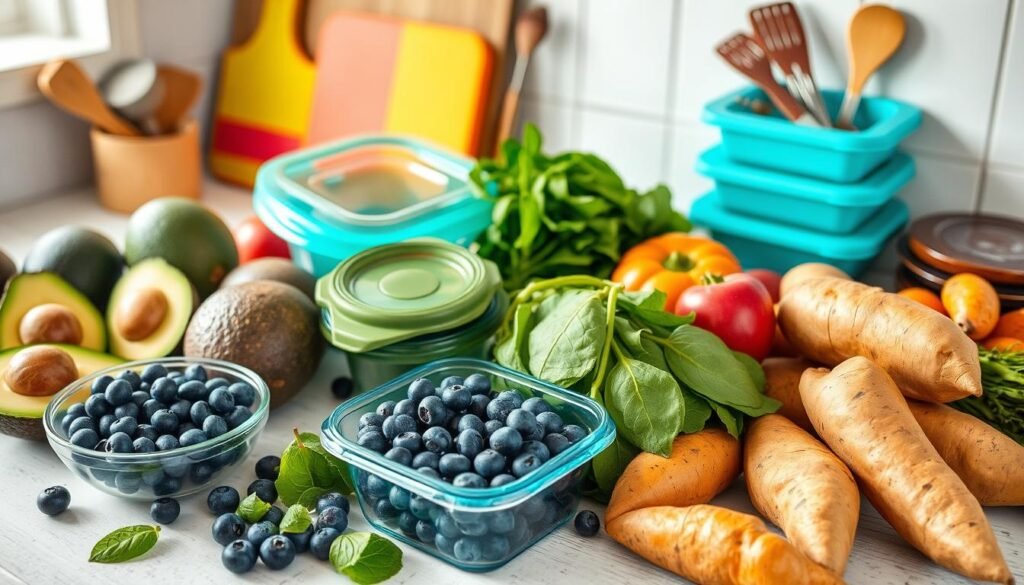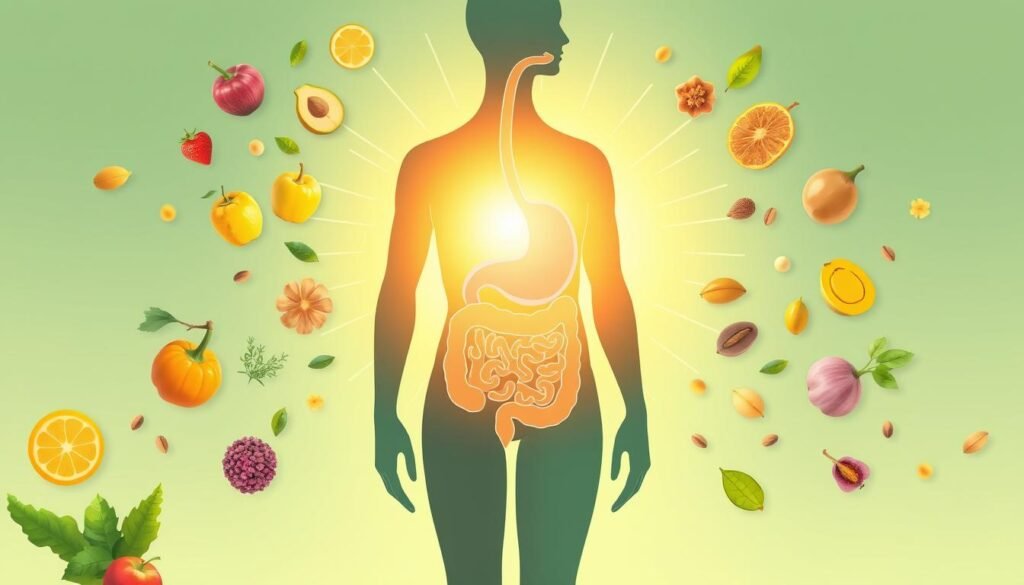Did you know acne hits up to 50 million people in the U.S. each year? It’s the top skin issue nationwide. Many don’t realize that what they eat plays a big part in acne’s start. Studies indicate that some foods change hormone levels, upping oil production and swelling. This leads to acne. Choosing a diet that stops acne, filled with skin-helping nutrients, can make skin look better and control outbreaks. This piece will show the top foods for clear skin. It will also point out what to avoid for healthier skin. Let’s look into how eating impacts skin health.
Key Takeaways
- Acne affects 50 million people in the U.S. every year.
- Hormones and what we eat greatly affect skin condition.
- Not eating foods with a high glycemic index may lower acne risks.
- Adding omega-3 fats and antioxidants helps the skin.
- Planning meals well can lead to clearer skin.
Understanding Acne and Its Causes
Acne is a common skin problem that affects many people in the United States. It often starts during puberty but can also trouble adults. The problem begins when pores on the skin get blocked with dead skin cells, too much oil, and bacteria. Knowing what causes acne is key to controlling and preventing it.
Hormonal changes are a big reason behind acne. For instance, during puberty, the body makes more oil which can lead to pimples. A factor called insulin-like growth factor 1 (IGF-1) also plays a part by increasing oil production in the skin, causing acne.
Certain lifestyles and diet can also affect acne. There’s a lot of talk about how what you eat impacts your skin. Many think eating greasy food or chocolate directly causes acne. Yet, studies show that foods high in refined sugars and dairy products mainly contribute to the problem. But, these foods only make up about 25% of the causes.
Interestingly, a study found that people aged 7 to 30 who drank milk had a 25% higher chance of getting acne. On the other hand, eating plenty of fruits and veggies may help your skin stay healthy. They can lower inflammation and help avoid pimples. Understanding these points can help people make better choices for their skin and overall health.
| Acne Causes | Influential Factors |
|---|---|
| Hormonal Changes | Excess oil production during puberty |
| Dietary Choices | High intake of dairy and refined sugars |
| Stress Levels | Increased cortisol influencing skin health |
| Genetics | Family history of acne-prone skin |
| Environmental Factors | Exposure to pollutants and irritants |
The Acne-Prevention Diet: Foods for Healthier Skin
Diet is key for keeping your skin healthy and fighting acne. Certain foods are known to make skin conditions better. This is the basis of an acne-fighting diet. It focuses on eating right, not eating less. Foods like whole grains, fruits, and veggies can help reduce acne flare-ups.
Importance of Diet in Skin Health
Eating a variety of nutritious foods is essential for skin health. Foods rich in vitamins, minerals, and healthy fats are important. But, eating too much processed sugar and bad fats can make acne worse. This happens because they can change hormone levels and increase inflammation and oil in the skin.
Hormonal Influence on Acne Development
Your diet affects hormones that can make acne worse. Foods with a high glycemic load can increase insulin and androgen hormones. This leads to more oil on the skin and more acne. Choosing foods with a lower glycemic load can help keep hormones balanced. This, in turn, can lead to clearer skin.
Foods to Avoid for Clearer Skin
What you eat plays a big part in skin health, especially if you get acne. To keep your skin clear, knowing which foods may cause trouble is vital. We’ll look at high glycemic foods, usual acne triggers, and dairy’s impact on skin. This info helps choose the right foods for managing acne.
High Glycemic Foods and Their Impact
High glycemic foods can quickly raise your blood sugar. This can lead to inflammation and make acne worse. Eating foods like white bread, sweet snacks, and some veggies often links to more severe acne. A study in the USA showed eating less of these foods helped reduce acne. This shows how much what you eat affects your skin.
Trigger Foods that May Worsen Acne
Research has found certain foods that can trigger acne. These include:
- Processed sugar products
- Fried and fatty foods
- Refined carbs like white rice and flour
- Milk chocolate and other sweet treats
- Caffeine, especially with sugar or dairy
Eating fewer of these foods can make your skin clearer. It’s becoming clear that avoiding them is a good step in preventing acne.
Understanding Dairy and Its Role in Acne
The link between dairy and acne is getting a lot of attention. Drinking a lot of cow’s milk may increase the risk of developing acne. Research involving thousands showed women drinking two or more glasses of skim milk daily had a 44% higher acne risk. Milk hormones might make your skin oilier, causing clogged pores and breakouts.
With this evidence, cutting back or stopping dairy could help people with acne. Choosing almond or oat milk might be better for clear skin.
| Food Category | Examples | Effects on Acne |
|---|---|---|
| High Glycemic Foods | White bread, sugary drinks, pastries | Increase blood sugar; trigger acne |
| Trigger Foods | Chips, chocolates, fried foods | Promote inflammation; worsen breakouts |
| Dairy | Cow’s milk, cheese, yogurt | Associated with increased risk; stimulates oil production |
Key Nutrients for Acne Prevention
Clear skin is about more than just skin creams. It’s vital to focus on key nutrients. These include omega-3 fatty acids, essential vitamins, and antioxidants. They tackle acne at its root and boost skin health.
The Role of Omega-3 Fatty Acids
Omega-3s are powerful in fighting inflammation. This can help prevent acne. Studies show that more omega-3 can mean fewer acne outbreaks. Foods rich in omega-3, like salmon, nuts, and seeds, are good for your skin.
Vitamins and Minerals Essential for Skin Health
Vitamins A, C, and E and zinc are important for fighting skin inflammation. Zinc is particularly good at this. Eat plenty of leafy greens, whole grains, and beans to get these nutrients. They strengthen your skin’s ability to heal and stay healthy.
Benefits of Antioxidants in Fighting Acne
Antioxidants protect your skin from damage by free radicals, which can cause acne. People with acne often need more antioxidants, like selenium. Blueberries, green tea, and veggies are great sources. A diet rich in antioxidants helps your skin fight inflammation and stay clear.

| Nutrient | Sources | Benefits |
|---|---|---|
| Omega-3 Fatty Acids | Salmon, walnuts, flaxseeds | Reduces inflammation, supports skin healing |
| Zinc | Beans, nuts, whole grains | Anti-inflammatory effects, promotes skin repair |
| Vitamins A, C, E | Leafy greens, citrus fruits, nuts | Helps reduce inflammation, essential for skin health |
| Antioxidants | Blueberries, green tea, dark chocolate | Combats oxidative stress, supports skin protection |
Top Food Choices for a Clear Skin Diet
Choosing the right foods is key for healthy skin. A balanced diet with the best foods for skin leads to a clear complexion. This part will talk about the best food choices for those looking to eat for skin health, especially fruits and veggies to fight acne.
Fruits and Vegetables that Promote Skin Health
Fruits and veggies are a must for a clear skin diet. They’re full of vitamins, minerals, and antioxidants. Adding these foods can make a big difference in your skin health. Here’s what you should try:
- Berries: Rich in vitamin C and antioxidants, berries help fight off damage and boost skin elasticity.
- Sweet Potatoes: With lots of beta-carotene, they help keep the skin strong and prevent damage.
- Leafy Greens: Kale and spinach are loaded with vitamins A, C, and K for skin repair and rejuvenation.
- Broccoli: It has sulforaphane which fights inflammation and enhances skin health.
Whole Grains and Lean Proteins to Include
Whole grains and lean proteins are essential for a skin-friendly diet. They give you energy and nutrients while fighting skin problems. Here are some good choices:
- Quinoa: It’s full of protein and fiber, helping to control blood sugar and reduce acne.
- Turkey: A great source of protein that boosts collagen for skin repair and health.
- Legumes: Chickpeas and lentils keep blood sugar stable and enhance skin texture.
Healthy Fats and Their Benefits
Adding healthy fats to your diet is key for keeping skin hydrated and protected. The right fats boost skin elasticity and fight inflammation. Here’s what to include:
- Fatty Fish: Salmon and mackerel, rich in omega-3s, reduce inflammation and improve skin.
- Nuts and Seeds: Sources of healthy fats and antioxidants, they help keep your skin moisturized.
- Avocados: Packed with vitamins E and C, they nourish the skin and fight oxidative stress.
| Food Type | Key Benefits |
|---|---|
| Fruits (Berries, Sweet Potatoes) | Rich in vitamins and antioxidants |
| Vegetables (Kale, Broccoli) | Anti-inflammatory properties |
| Whole Grains (Quinoa) | Stabilizes blood sugar, high in fiber |
| Lean Proteins (Turkey, Legumes) | Supports collagen production |
| Healthy Fats (Fish, Nuts) | Improves skin hydration |
Embracing these top food choices is great for clear skin. Knowing how diet affects skin health allows you to choose foods that boost your complexion. This helps you keep your skin clear and glowing.
Meal Planning for Blemish-Fighting Meals
Planning meals for your skin’s health is key to stopping acne and getting a glowing complexion. A diet that focuses on the right nutrients greatly helps keep skin clear. By eating wholesome, nutrient-packed foods, you can follow a healthy routine that fights acne and boosts overall health.
Creating a Balanced Diet for Clear Skin
For clear skin, a good meal plan includes lots of high-fiber foods. Foods like brown rice, whole wheat pasta, lentils, and fruits help digestion and keep blood sugar levels steady. Steady blood sugar helps prevent blemishes. Omega-3 fatty acids from salmon, flax seeds, and walnuts reduce inflammation and make skin smoother.
Sample Acne-Clearing Recipes
Check out these recipes if you want to eat foods that fight blemishes:
- Day 1: Breakfast: Overnight oats with chia seeds and berries. Lunch: Quinoa salad with mixed greens and lemon dressing. Dinner: Grilled salmon with steamed broccoli.
- Day 2: Breakfast: Smoothie with spinach, banana, and almond milk. Lunch: Lentil soup with whole grain bread. Dinner: Stir-fried tofu with vegetables and brown rice.
- Day 3: Breakfast: Greek yogurt with fresh fruits. Lunch: Chickpea salad with cucumbers and tomatoes. Dinner: Baked chicken with roasted sweet potatoes and asparagus.
Tips for Shopping a Glowing Skin Grocery List
It’s crucial to create a smart grocery list for clear skin. Stick to whole, unprocessed foods to eat less sugar and unhealthy fats. Add foods high in zinc, like nuts and legumes, and fruits full of antioxidants, such as papayas and citrus fruits. You might also want to switch dairy for plant-based options to help prevent acne. Drinking 2 to 2.5 liters of water a day is vital for keeping skin moist and helping it heal.

Lifestyle Changes to Support Skin Health
Maintaining clear skin is more than just about what you eat. Lifestyle changes are key to healthier skin. Drinking enough water every day is crucial. It keeps your skin moist, improves its barrier, and makes it look better. Moreover, managing stress is important for avoiding acne. Stress can cause hormonal changes, leading to more oil on your skin and acne.
The Importance of Hydration
Staying hydrated is crucial for your skin’s health. Eating foods like cucumbers and watermelons helps hydrate your skin. When your body is well-hydrated, your skin stays elastic and looks radiant. Make sure to drink lots of fluids to help remove toxins from your body. By understanding how hydration affects your skin, you can make smarter choices.
Managing Stress for Acne Prevention
Controlling stress is a must for healthy skin. When you’re stressed, your body makes more cortisol. This hormone can make your skin oily and cause acne. Relaxing activities like mindfulness, yoga, and exercise can lower stress. Also, getting enough sleep helps avoid too much cortisol, keeping your skin healthy. Keeping things like your phone clean can help avoid acne too.
| Lifestyle Factor | Impact on Skin Health |
|---|---|
| Hydration | Improves skin moisture and barrier function |
| Stress Management | Regulates hormone levels and reduces acne triggers |
| Sleep Quality | Prevents cortisol surges that can worsen skin issues |
| Cleanliness of Personal Items | Reduces bacteria exposure leading to breakouts |
Connecting Gut Health and Skin Clarity
The link between a healthy gut and clear skin is well-known now. A balanced gut microbiome plays a key role in skin health. If the gut’s microbial balance is off, acne might get worse. This shows the need for keeping the gut healthy.
Probiotics and Their Role in Skin Wellness
Probiotics are crucial for reducing skin inflammation and making the skin barrier stronger. Lactobacillus acidophilus and other probiotics help achieve healthier skin. Eating foods rich in probiotics, like yogurt and kimchi, helps balance the gut. This can lessen acne by reducing inflammation.
Foods that Support a Healthy Microbiome
Eating well is key to skin clarity. Diets with lots of plants, grains, and protein help grow good bacteria, leading to better skin health. Fiber-rich foods, like garlic, feed this good bacteria. However, too much junk food can harm the gut and worsen acne. Knowing this helps us choose foods that are good for both our gut and skin.

| Food Types | Benefits |
|---|---|
| Probiotic Foods | Enhances beneficial bacteria, reduces inflammation. |
| High-Fiber Foods | Supports microbial diversity, improves digestion. |
| Processed Foods | Disrupts gut balance, may worsen acne. |
| Plant-Based Foods | Rich in vitamins and minerals, promotes skin elasticity. |
Staying hydrated and managing stress are also important for gut and skin health. These habits help maintain a balanced microbiome for clearer skin. By understanding these links, people can make better diet and lifestyle choices. This improves not just gut health, but also skin clarity.
Long-term Strategies for Maintaining Clear Skin
Getting and keeping clear skin needs regular work. People should look closely at their skin changes and tweak their diets. These steps help find the best way to care for their skin in the long run.
Tracking Dietary Changes and Skin Reactions
Tracking what you eat and how it affects your skin is key. Writing down your meals and skin reactions can show which foods are good or bad for your skin. You learn how different foods impact your skin over time.
- Write down daily food intake.
- Note any skin changes or reactions following meals.
- Identify patterns connecting specific foods to skin issues.
Keeping track of skin changes and diet can reveal what works for clearer skin. It helps make better food choices for your skin’s sake.
Understanding the Timeframe for Results
It’s important to remember that fixing your skin takes time. Changing your diet doesn’t give instant results. Often, it takes weeks to see real improvements in your skin.
Patience and sticking with your plan is vital. Regularly checking your skin helps tweak your care routine as needed.
In the end, these methods can make your skin healthier. Staying dedicated to watching your diet and knowing it takes time to see changes are the secrets to lasting skin care.
| Dietary Changes | Effects on Skin |
|---|---|
| Increased fruits and vegetables | Boosts vitamins and antioxidants, helps reduce inflammation |
| Reduced processed sugars | May lower insulin levels and oil production, improving skin quality |
| Hydration through adequate water intake | Flushes out toxins, maintains skin moisture |
| Prioritizing lean proteins | Supports collagen production and tissue repair |
| Limiting dairy intake | May reduce acne severity linked to hormonal triggers |
Conclusion
The acne-prevention diet is crucial for clear skin. Eating foods low in glycemic levels, rich in healthy fats, and full of vitamins helps skin health. Foods with vitamins A, C, D, and E fight inflammation and breakouts.
By following the clear skin tips mentioned, you can see better skin health. Remember, getting lasting results takes time and dedication to healthy habits. Small changes in your diet and lifestyle can lead to less acne and healthier skin.
For extra tips on preventing acne, check out this resource. It offers more advice on daily habits for skin care. Staying mindful about what you eat is key for long-term skin health.